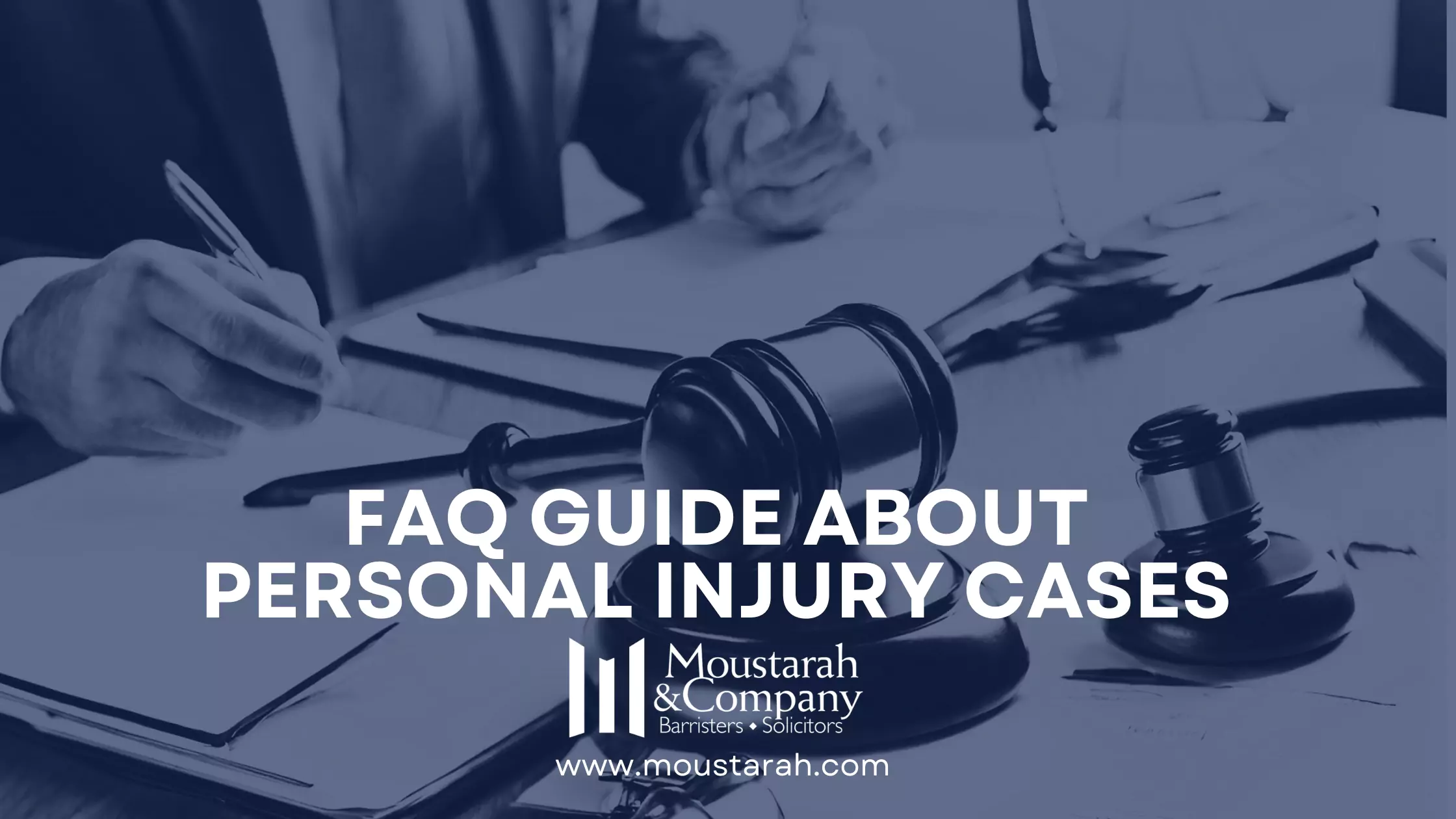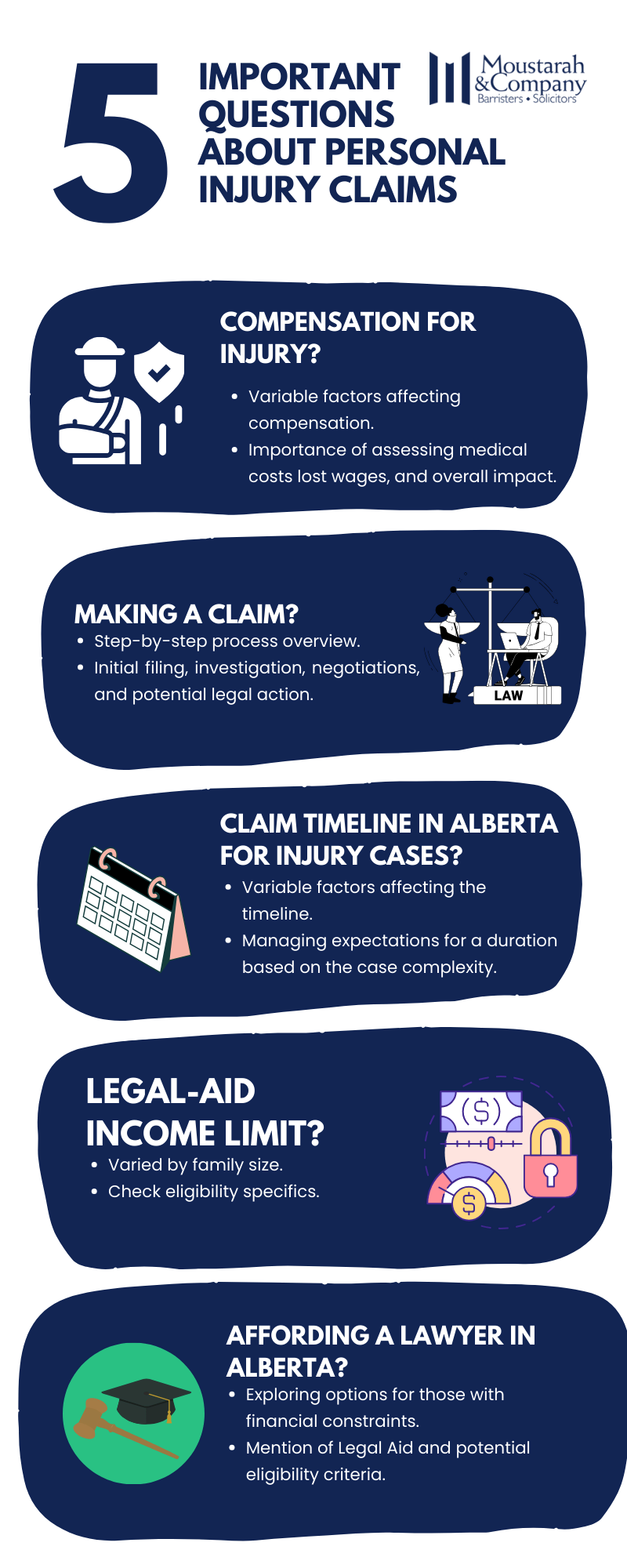Welcome to our guide on Frequently Asked Questions for Personal Injury Claims. Navigating the intricacies of personal injury law can be a daunting task, and we understand the importance of having clear, concise answers to common queries. In this comprehensive resource, we aim to provide you with insightful and informative responses to questions that often arise during the personal injury claims process. This personal injury claim FAQ is written by your Edmonton personal injury law firm that has over 2 decades of experience and is a precedent setting law firm. This shows that we are experts at personal injury law.
Whether you’re wondering about compensation amounts, the legal steps involved, or the role of a personal injury lawyer, our FAQ guide is designed to empower you with the knowledge needed to make informed decisions. Let’s delve into the key questions surrounding personal injury claims and equip you with the information necessary to protect your rights and pursue fair compensation.
Frequently Asked Questions for Personal Injury Claims
The questions below are commonly asked questions for personal injury claims.
How much compensation do you get for personal injury?
Compensation varies based on factors like the severity of injuries, medical expenses, lost income, and the impact on daily life. It’s determined case by case, often through negotiations or legal proceedings. What is the average settlement amount for injuries from a car accident in Alberta?
What happens when you make a personal injury claim?
Upon filing a claim, an investigation ensues, involving gathering evidence, assessing damages, and negotiating with insurance companies. If an agreement isn’t reached, legal action may follow, leading to a trial or settlement.
How far back can you claim personal injury?
In Alberta, the general limitation period for personal injury claims is two years from the date of the incident. It’s crucial to initiate the claim within this time frame to preserve your legal rights.
What steps should you take if someone gets injured?
If someone is injured, seek immediate medical attention. Document the accident scene, gather witness information, and contact a personal injury lawyer promptly to ensure proper legal guidance.
Why should you get a personal injury lawyer?
A personal injury lawyer helps navigate complex legal processes, assesses the true value of your claim, negotiates with insurance companies, and ensures you receive fair compensation for your injuries and losses.
How much will I get from a car accident settlement in Alberta?
The amount varies depending on factors such as the extent of injuries, liability, and insurance coverage. Consulting with a personal injury lawyer can provide a more accurate estimate based on your specific case.
What is the largest personal injury settlement in Canada?
While figures change, notable personal injury settlements in Canada have reached multi million dollar amounts, often in cases involving severe injuries or fatalities.
How much is the average settlement for pain and suffering in Alberta?
The average settlement for pain and suffering in Alberta varies widely, considering factors such as the nature of injuries, their impact on daily life, and the emotional toll. Legal advice is crucial to assess your case accurately. Moustarah & Company combines their extensive knowledge with their unwavering dedication to ensure that you receive fair compensation.
How long does it take to settle a personal injury claim in Alberta?
The timeline varies, ranging from several months to years, depending on factors like case complexity, negotiations, and court proceedings. It can take as little as a few days to several years to settle a car accident claim in Alberta. A personal injury lawyer can provide a more tailored estimate based on your circumstances. You must file a claim before 2 years, and many claims are settled within a 2 year time frame after it is initially filed.
Are personal injury lawyers worth it?
Yes, personal injury lawyers are worth it as they possess the expertise to navigate legal complexities, advocate for your rights, and maximize your chances of receiving fair compensation for your injuries and losses. Moustarah & Company never works for the insurance company. They only work against the insurance company – fighting for your full and fair compensation. Our team of legal experts will aggressively fight for you. We are on your team, reducing your stress and worry. We work diligently to pursue every area of compensation; and at the same time, we connect you with the highest-quality health care professionals to ensure that you receive the best treatment and heal as fast as possible.
21+ years of car accident injury law experience
780-428-6565
Extensive Knowledge Unwavering Dedication
Are personal injury settlements taxable?
Generally, personal injury settlements for physical injuries are not taxable in Canada. However, it’s advisable to consult with a tax professional for specific advice tailored to your situation.
What is considered personal injury law?
Personal injury law encompasses cases where individuals suffer harm due to the negligence or intentional actions of others. It includes incidents like car accidents, slips and falls, medical malpractice, and more. The majority of personal injury law is Motor Vehicle Accidents (MVA). And you might still have a claim, even if you are found partially at fault in the collision.
How long can I sue after a car accident?
In Alberta, the general limitation period is two years from the date of the accident. Failing to initiate legal action within this time frame may result in losing the right to sue. Consult with our team as soon as possible to ensure that we can help every step along the way.
How often should I hear from my personal injury lawyer?
Communication frequency can vary, but a good personal injury lawyer should keep you informed about the progress of your case, and important developments, and be responsive to your inquiries. Regular updates ensure you stay informed and involved in your legal proceedings.
How to choose a personal injury lawyer?
When selecting a personal injury lawyer, consider their experience, specialization in personal injury law, track record of successful cases, and client reviews. A consultation with the lawyer can help gauge their understanding of your case and their ability to represent you effectively. Moustarah & Company has over 500 except and postive reviews on Google, Lawyerratingz, Facebook, Yelp, and other platforms. We have thousands of happy clients because Moustarah & Company are the top Personal Injury Lawyers in Edmonton and all across Alberta. Moustarah & Company brings extensive knowledge and unwavering dedication to every personal injury claim.
How much do personal injury lawyers charge?
Personal injury lawyers typically work on a contingency fee basis, meaning they only get paid if you receive compensation. The standard contingency fee is a percentage of the settlement, usually between 30-40% plus GST, which is agreed upon before they take your case.
Can a personal injury lawyer drop your case?
In certain circumstances, a lawyer may withdraw from a case, but it’s not common. Valid reasons may include a client’s failure to cooperate, ethical concerns, or if the lawyer is unable to represent you effectively. Consult with the lawyer for specifics.
Do I need a lawyer for a personal injury claim?
While it’s not mandatory, having a personal injury lawyer significantly enhances your chances of a successful claim. They understand the legal intricacies, assess the true value of your claim, and negotiate on your behalf, ensuring you receive fair compensation. Especially as the Alberta Government has recently brought changes in law regarding personal injury claims. Important changes were made to the law in October 2020 that will affect your personal injury and vehicle claim in Alberta. And changes to insurance law in January 2022. These changes in the law and the very complex personal injury legal process makes it very important for you to have an Edmonton personal injury lawyer for any personal injury claim in Alberta.
What’s a personal injury lawyer?
A personal injury lawyer specializes in representing individuals who have suffered physical or psychological harm due to the negligence or intentional actions of others. They provide legal assistance to help victims seek compensation for their injuries and losses.
When to get a personal injury lawyer?
It’s advisable to consult a personal injury lawyer as soon as possible after an accident or injury. Early involvement allows the lawyer to gather evidence, assess the case’s strength, and guide you on the necessary steps to protect your legal rights.
21+ years of car accident injury law experience
780-428-6565
Extensive Knowledge Unwavering Dedication
How much should a personal injury lawyer charge?
Personal injury lawyers typically charge a contingency fee, which is a percentage of the settlement. The specific percentage can vary, but it’s generally around 30-40% plus GST, agreed upon before they take your case. This fee structure ensures accessibility for clients, as no upfront payment is required.
What if you can’t afford a lawyer in Alberta?
Moustarah & Company does not charge any fees for personal injury claim until the claim is settled and you receive your compensation. There is no upfront fees for personal injury claims in Alberta. Since there is no fee upfront, then everyone can afford a personal injury lawyer. For criminal defence cases, Legal Aid Alberta assists those who cannot afford legal representation. Eligibility is based on income and case merit. Contact Legal Aid Alberta to determine if you qualify for their services.
Conclusion: Guide through Personal Injury Claims with Confidence
In the complex realm of personal injury law, understanding your rights and the intricacies of the claims process is crucial. Our Frequently Asked Questions guide aims to empower you with clear, concise answers to common queries, providing the knowledge necessary to make informed decisions.
From compensation amounts to legal steps, the role of a personal injury lawyer, and more, we’ve covered key aspects to guide you through this challenging journey. Remember, seeking fair compensation is not just a legal matter—it’s about regaining control and rebuilding after an injury.
Whether you’ve experienced a car accident, slip and fall, or medical malpractice, knowing your rights is the first step towards justice. Consult our guide for comprehensive information on personal injury claims and take charge of your path to recovery.
At the heart of it all, a personal injury lawyer can be your greatest ally. They navigate legal complexities, advocate for your rights, and maximize your chances of receiving fair compensation for your injuries and losses. While the process may seem daunting, your rights and well-being deserve the attention and expertise that only a seasoned personal injury attorney can provide.
Remember, it’s not just about the legal journey; it’s about reclaiming control and moving forward. If you have further questions or need personalized guidance, don’t hesitate to reach out to a qualified personal injury lawyer. Your path to justice and recovery starts with informed decisions.



